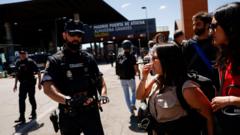The Iberian Peninsula experienced significant disruptions on Monday due to a large-scale power outage affecting transportation, communication, and daily activities, with authorities working diligently to restore services.
Widespread Blackout Disrupts Daily Life in Spain and Portugal

Widespread Blackout Disrupts Daily Life in Spain and Portugal
A massive power outage left millions in Spain and Portugal struggling with chaos and confusion as services ground to a halt.
A significant power failure struck vast areas of Spain and Portugal on Monday, enveloping millions in darkness and confusion. High volumes of people lost electricity, leading to breakdowns in internet and phone services. The chaos manifested in train cancellations and evacuations, alongside dysfunctional traffic signals that compounded travel delays at busy airports. Residents faced shops, homes, and restaurants cloaked in darkness, with some individuals finding themselves stranded in elevators. By mid-afternoon, the electricity companies suggested that restoring power might take several hours, though the cause of the outage was unspecified. Portuguese Prime Minister Luis Montenegro affirmed there was "no indication" of a cyber attack.
Starting around midday (13:00 BST), the outage quickly grew, prompting Madrid's government to advise citizens to remain stationary, avoid the roads, and reserve emergency calls for only the most urgent situations. Spain's power operators estimated restoration could take up to 10 hours, while Portugal’s REN predicted a recovery period of up to a week.
Visibility issues forced the enforcement of order in the capital, as police attempted to manage public transport outages compounded by chaos at cash machines caused by disrupted card payments. In response, hospitals initiated emergency measures, pausing routine procedures. By early evening, light gradually returned to some regions, with the Spanish grid operator noting that power had begun to be restored in several parts of the north, south, and west.
As the hours dragged on, authorities in both countries were left to comprehend the blackout's underlying cause, with no evidence of cyber interference reported by European Council President Antonio Costa. Amid mounting panic, Madrid's mayor, José Luis Martínez-Almeida, urged residents to limit movements and keep thoroughfares clear, suggesting emergency services be contacted only when absolutely necessary.
The blackout's ramifications were wide-ranging, with nuclear plants shutting down and the oil industry halting operations in response. Airports saw cancellations and delays, particularly affecting airlines like EasyJet, which advised passengers to stay updated with local information. Businesses faced substantial impact; several Ikea locations resorted to backup generators and limited customer access, while the Madrid Open Tennis event was called off for the day. Nearby regions, including Andorra and parts of France, experienced outages as well, though the Balearic and Canary Islands remained untouched.





















